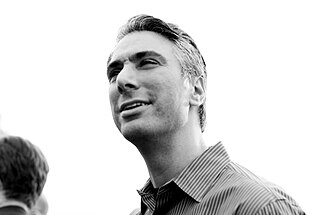Related Research Articles

In industry, models of the learning or experience curve effect express the relationship between experience producing a good and the efficiency of that production, specifically, efficiency gains that follow investment in the effort. The effect has large implications for costs and market share, which can increase competitive advantage over time.

Clayton Magleby Christensen was an American academic and business consultant who developed the theory of "disruptive innovation", which has been called the most influential business idea of the early 21st century. Christensen introduced "disruption" in his 1997 book The Innovator's Dilemma, and it led The Economist to term him "the most influential management thinker of his time." He served as the Kim B. Clark Professor of Business Administration at the Harvard Business School (HBS), and was also a leader and writer in the Church of Jesus Christ of Latter-day Saints. He was one of the founders of the Jobs to Be Done development methodology.

McKinsey & Company is an American multinational strategy and management consulting firm that offers professional services to corporations, governments, and other organizations. Founded in 1926 by James O. McKinsey, McKinsey is the oldest and largest of the "MBB" management consultancies (MBB). The firm mainly focuses on the finances and operations of their clients.

Bruce Doolin Henderson was an American businessman and management expert. He founded Boston Consulting Group (BCG) in 1963 in Boston, Massachusetts and headed the firm as the president and CEO until 1980. He continued as chairman of BCG until 1985.

China Baowu Steel Group Corp., Ltd., commonly known as Baowu, is a state-owned iron and steel company headquartered in the Baosteel Tower in Pudong, Shanghai, China. The company was formed by Baosteel Group absorbing its smaller state-owned peer, Wuhan Iron and Steel Corporation in 2016. It is the world's largest steel producer.

The Fuqua School of Business is the business school of Duke University, a private research university in Durham, North Carolina. It enrolls more than 1,300 students in degree-seeking programs. Duke Executive Education also offers non-degree business education and professional development programs.
Wharton School Press (WSP) is the book publishing arm of The Wharton School of the University of Pennsylvania. It was established in 2011 and is headquartered in Philadelphia, Pennsylvania.
Organizational intelligence (OI) is the capability of an organization to comprehend and create knowledge relevant to its purpose; in words, it is the intellectual capacity of the entire organization. With relevant organizational intelligence comes great potential value for companies and organizations to figure out where their strengths and weaknesses lie in responding to change and complexity.
George S. Day is an educator and consultant in the fields of strategic management, innovation and marketing. He is the Geoffrey T. Boisi Emeritus Professor at the Wharton School of the University of Pennsylvania. He founded the Mack Institute for Innovation Management at the Wharton School, where he is a Faculty Emeritus in Residence.
Thomas Hayes "Tom" Davenport, Jr. is an American academic and author specializing in analytics, business process innovation, knowledge management, and artificial intelligence. He is currently the President’s Distinguished Professor in Information Technology and Management at Babson College, a Fellow of the MIT Initiative on the Digital Economy, Co-founder of the International Institute for Analytics, and a Senior Advisor to Deloitte Analytics.
Globality is the consciousness of the world as a single place. The concept of globality was introduced in the social sciences by British sociologist Roland Robertson. It signifies the spreading and deepening consciousness of the world-as-a-whole and could thus be considered the phenomenological aspect of globalization, which Robertson defined as "the compression of the world and the intensification of consciousness of the world as a whole".

Kevin Werbach is an American academic, businessman and author. In 2002, he founded the Supernova Group, a technology analysis and consulting firm. Since 2004, Werbach is an Associate Professor of Legal Studies and Business Ethics at The Wharton School, University of Pennsylvania. He writes about business, policy, and social implications of emerging Internet and communications technologies.

yet2.com is a global open innovation consulting company and technology marketplace founded in February 1999. The company is based around the idea of matching large companies with smaller companies, inventors, startups, and academic institutions, as well as allowing all types of technologies to be bought and sold on an online marketplace. Shortly after the company's founding in 1999, it became the largest global market for patents.

Bain & Company is an American management consulting company headquartered in Boston, Massachusetts. The firm provides advice to public, private, and non-profit organizations. One of the Big Three management consultancies, Bain & Company was founded in 1973 by former Group Vice President of Boston Consulting Group Bill Bain and his colleagues, including Patrick F. Graham. In the late 1970s and early 1980s, the firm grew rapidly. Bill Bain later spun off the alternative investment business into Bain Capital in 1984 and appointed Mitt Romney as its first CEO. Bain experienced several setbacks and financial troubles from 1987 to the early 1990s. Romney and Orit Gadiesh are credited with returning the firm to profitability and growth in their sequential roles as the firm's CEO and chairman respectively.
Shikhar Ghosh is the MBA Class of 1961 Senior Lecturer in the Entrepreneurial Management Unit at the Harvard Business School. He teaches an MBA course called The Entrepreneurial Manager. Shikhar has been a entrepreneur for the last 20 years. He has been the founder and CEO or Chairman of eight technology-based entrepreneurial companies and was the past Chairman of the Massachusetts Technology Leadership Council and The Indus Entrepreneurs - 2 leading entrepreneurial organizations. He was selected by BusinessWeek as one of the best Entrepreneurs in the US, Forbes as one of the ‘Masters of the Internet Universe’ and Fortune as the CEO of one of the 10 most innovative companies in the US. Companies he founded were selected as both the ‘hottest’ and ‘coolest’ emerging companies by business publications.
Mauro F. Guillén is a Spanish-American sociologist and political economist who is currently the William H. Wurster Professor of Multinational Management at the Wharton School. In March 2021, he was named Dean of the Cambridge Judge Business School, and a Fellow of Queens' College at the University of Cambridge; he returned to Wharton in 2023. Until July 2021, he directed the Penn Lauder Center for International Business Education and Research, and was the Anthony L. Davis Director of the Joseph H. Lauder Institute of Management and International Studies from 2007 to 2019. His book 2030: How Today's Biggest Trends Will Collide and Reshape the Future of Everything was a Wall Street Journal bestseller and a Financial Times Book of the Year.

The following outline is provided as an overview of and topical guide to the broad, interdisciplinary subject of globalization:
Michael G. Jacobides is a British economist and public speaker. His main areas of interest are digital platforms and ecosystems, financial services and turnarounds. He is the Sir Donald Gordon Chair of Entrepreneurship & Innovation at London Business School. He is Academic Advisor to the Boston Consulting Group, Chief Expert Advisor on Digital Economy to the Hellenic Competition Commission, visiting scholar at the New York Fed, and visiting fellow at Cambridge University.
Morten T. Hansen is a Norwegian-American professor, management theorist, motivational speaker and author.
Deep technology or hard tech is a classification of organization, or more typically startup company, with the expressed objective of providing technology solutions based on substantial scientific or engineering challenges. They present challenges requiring lengthy research and development, and large capital investment before successful commercialization. Their primary risk is technical risk, while market risk is often significantly lower due to the clear potential value of the solution to society. The underlying scientific or engineering problems being solved by deep tech and hard tech companies generate valuable intellectual property and are hard to reproduce.
References
- ↑ Sirkin, Harold L.; James P. Andrew, and John Butman (2007-01-09), Payback: Reaping the Rewards of Innovation, Cambridge, Massachusetts: Harvard Business School Press, pp. 228, ISBN 978-1-4221-0313-5
- ↑ Sirkin, Harold L.; James W. Hemerling, and Arindam K. Bhattacharya (2008-06-11), Globality: Competing with Everyone from Everywhere for Everything, New York, New York: Business Plus, pp. 304, ISBN 978-0-446-17829-7
- ↑ "Innovation and Design Books 2006". BusinessWeek. 2006-12-06. Archived from the original on December 8, 2006. Retrieved 2008-10-22.
- ↑ "Books of the year: Pick of the pile". The Economist. 2008-12-04. Archived from the original on December 8, 2006. Retrieved 2009-06-29.